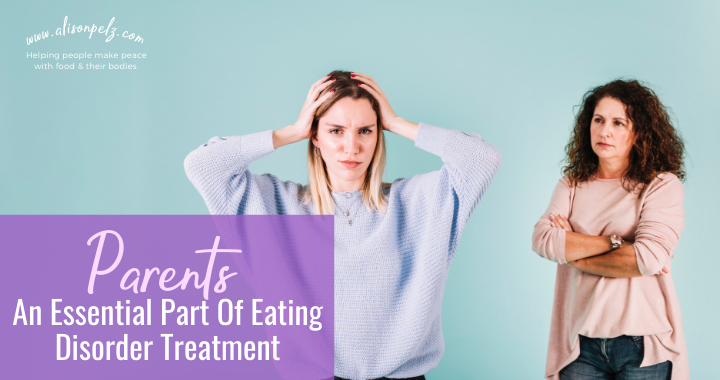To all the parents out there: you are an important part of your child’s eating disorder treatment team! This is true even if your child is no longer a child, but a young adult or an adult. Even if you don’t live with your child, you have an important role to play in eating disorder recovery.
Why are parents + caregivers so important in eating disorder recovery?
Therapists, doctors, and dietitians are must-haves on any eating disorder treatment team. But parents have an important role to play too! Here are a few reasons why parents are important in the recovery process:
- You spend much more time with your child than the treatment team does. As a therapist, I may spend one to two hours a week with your kiddo, you spend dozens of hours!
- You are usually involved in feeding or making sure that your teen is fed.
- You have a relationship with them. They trust and love you. If you are a parent of a teen, I know it may not always feel like it, but it is true!
- You know your child better than anyone else!
Where do eating disorders come from?
Eating disorders are thought to function as a way to cope with uncomfortable feelings. Feeling distressing emotions is, well, distressing. Eating disorders often develop as a coping mechanism to avoid feeling those painful feelings. It’s possible to learn new ways to cope to manage those distressing feelings.
As a parent, you can learn tools to help your child manage their feelings without using the eating disorder to cope.
When you hear this you may feel like a deer caught in the headlights.
- You may be thinking, “Yeah right! I can’t even get through a conversation with my teen without it turning into a fight.”
- Or maybe you’re thinking, “I can’t get them to say more than a few words to me.”
- You may even be throwing your arms up in exasperation because your kiddo is in total denial of their eating disorder.
If your child has an eating disorder, you may be feeling a range of emotions all of which are okay. You might feel anger, worry, sadness, resentment, disbelief, panic, and hopelessness, to name a few. And you may be feeling no way equipped to help your child recover from an eating disorder, but you are wrong.
Historically, parents weren’t always involved, and at times even discouraged to participate, in the treatment of eating disorders. In recent years, we are learning that parents can be a really powerful tool in their kid’s recovery process. This holds true not just for eating disorders, but for all mental health conditions. Parents have an important role to play!
Parents often blame themselves or feel responsible for their child’s eating disorder.
I haven’t met a parent or loved one who doesn’t want what is best for their loved one – to be happy and live a productive, healthy life.
Let me be clear: you are not to blame for your child’s eating disorder.
Eating disorders are complex. They develop for a variety of different reasons including social, biological, and psychological factors. For example, did you know that being a girl or a history of dieting are risk factors for developing an eating disorder?
As an eating disorder therapist + dietitian, I encourage parents to focus less on why their child has an eating disorder, and more on eliminating the eating disorder.
For example, if your child developed cancer you would spend less thought on why she got it, but more on getting her good treatment.
While you are not to blame for your child’s eating disorder, you certainly can be part of the treatment and solution. Often, parents don’t feel equipped to help their children recover. Parenting is hard, and parenting a teen with an eating disorder has a unique set of challenges.
You are right you may not have the eating disorder knowledge (yet!) to help. But, you do have a special connection and bond with your child that is so powerful in the treatment of eating disorders.
Some parents report that their kids don’t want help for their eating disorder, or even that they are in denial about their eating disorder. Certainly, this feels like it is true, but it is not.
Remember eating disorders are a way for your child to cope with discomfort. Yep that’s right – just like their lovey or security blanket that they had as a kiddo! The disorder is serving a purpose, even if it’s not a healthy way to cope. Since the disorder is filling a need, it might seem like on the surface, your child doesn’t want to acknowledge or deal with it. However, living with an eating disorder can be a miserable existence. Your child deserves better!
Now that I have (hopefully) convinced you that you are an important part of your teens recovery, you may be asking yourself how do I help my teen?
Here are a few tips to get you started.
- Get educated about eating disorders. Here are specific resources for parents.
- Make sure that your teen has a complete treatment team.
- Verbalize to your teen that while you don’t have all the answers, eating disorders are serious mental health conditions, treatment is needed, and that you are going to be there every step of the way to support them.
